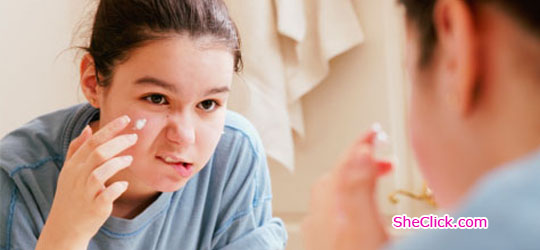{SCA}Acne is not caused by dirty skin, eating chocolate, or drinking lots of soda. Acne is caused by overactive oil glands in the skin and an accumulation of oil, dead skin cells, and bacteria, which leads to inflammation in pores.
Oil glands become stimulated when hormones become active during puberty, which is why people are likely to get acne in their teens. Because the tendency to develop acne is partly genetic, if other people in your family had (or have) acne, you may be more likely to develop it too.
What Causes Acne or Pimples:
Acne usually develop after blackheads or whiteheads have become infected. There are oil glands on your chest, face and back numbering in the thousands. In fact, between the nose and cheek areas there are as many as two thousand oil glands every square inch. The function of these oil glands is to lubricate the skin by producing oil, or sebum. Oil that is produced in the glands flows through follicles or tiny ducts to the surface of the skin. It usually starts far beneath the surface of the skin. A blemish (or internal lump) begins about 2 to 3 weeks before it appears on your skin’s surface.
Acne first begins to form in your sebaceous hair follicles. You know this as “pores”, the tiny holes on you skin. Deep within each hair follicle, sebaceous glands generate sebum, the oil that keeps your skin soft, moist and pliable. As part of your skin’s renewal process the old cells die and are shed off. Normally, this cell shedding process happens gradually, and fresh new skin takes its place. But sloughing (the process where living tissue is separated from dead skin tissue) is not the same for everyone. Some people shed cells evenly while others don’t. The result of uneven sloughing is that dead cells become sticky, clogging together to form a plug, similar to a cork in a bottle. This plug traps oil and bacteria inside the follicle.
The trapped oil begins to form a lump as your skin continues its normal oil production. Your body’s natural defense system then sends an army of white blood cells to attack the bacteria. The whole process takes around 2 to 3 weeks, resulting in a pimple.
Many teenagers experience acne (pimple ) outbreaks. It is at this time that the skin attempts to adjust to hormonal changes that occur during puberty. There is a tendency for most people when seeing a ‘ripe’ pimple try to pick or squeeze it. This will cause further damage to your skin as germs or bacterias from your finger tips can cause inflammation and scarring as a result. The risk of infection is also increased. Most times, when acne is ignored, it can leave visible scars on your skin.
Tips to Prevent Acne:
- Drink more water-it sound so cliche, But if you drink more water, you will properly hydrate your skin, flush out toxins, and otherwise keep your body in better working order. Acne is often an outward manifestation of another problem. So if you address this need, you will address many acne problems and prevent them from happening in the first place.
- Eat more fruits and vegetables, Fruits and vegetables are absolutely essential to health as a whole, because they are packed with vitamins, minerals, and antioxidants. Some have said that most cases of acne are related to vitamin deficiencies or toxins. Fruits and vegetables address both of these growing problems.
- Wash your face every day with a good scrub-yes, If you want to know how to prevent acne, one of the most essential ways is to wash your face every day with a scrub. A scrub has exfoliators which wash away dead skin cells. Ideally, a good acne scrub would also have powerful antibacterials and other acne fighters. But you should be washing your face every day twice a day, also preferably with a gentle acne solution.
- Find a powerful astringent, The best one I have found to date is actually called witch hazel. It’s cheap, effective, and beneficial in general terms. It has actually been known to provide other benefits to the skin. But as an astringent, it minimizes pores, keeping bacteria and otherwise out and helping you to prevent acne.
- Use sunscreen or avoid too much sun exposure, While there are some people who have the idea that sun exposure is the best way to prevent acne, it is exactly the opposite. If you are wondering how to prevent acne, that’s one of the easiest ways, and it also helps your skin in other ways. When your skin is exposed to too much sunlight, it ends up producing more excess oil, clogging pores, and therefore causing greater acne breakouts.
- Exercise-it’s important of course to really scrub the back to avoid back acne, getting rid of dirts, oils, and sweat. But the fact is that when you exercise, your body is releasing many of these dirts and bacteria. So if you exercise, you are doing yourself a number of favors, not the least of which is acne prevention.

